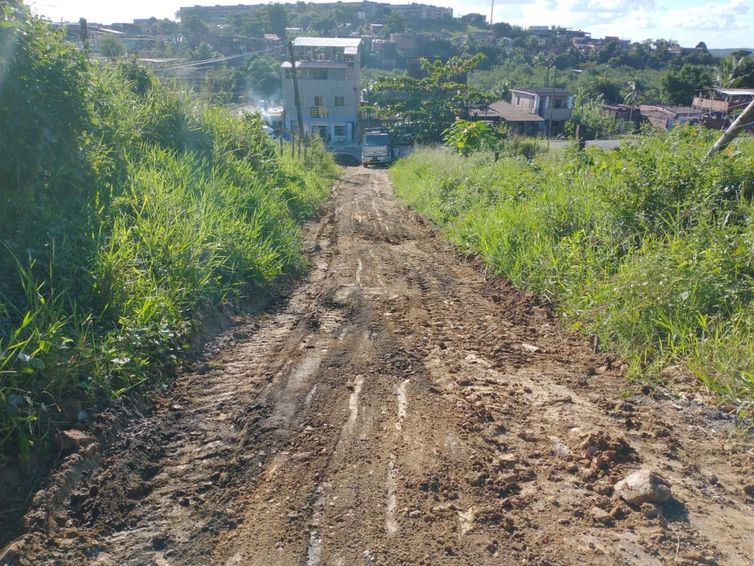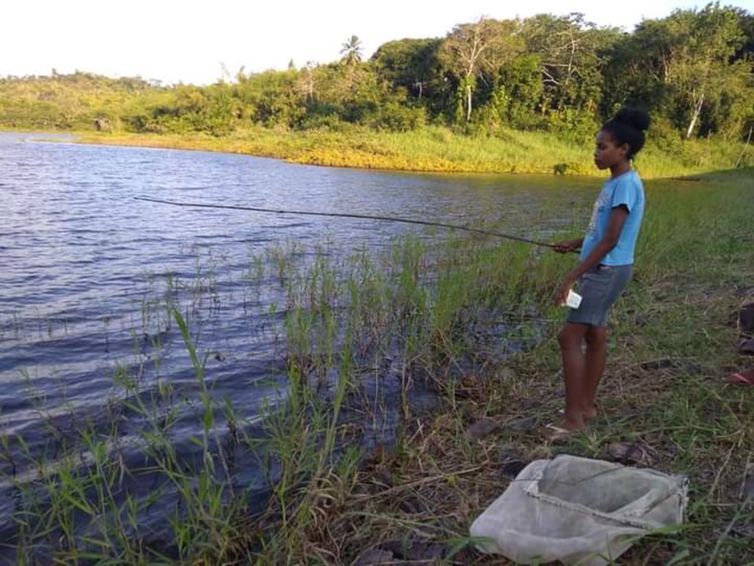Quilombola community that asked Lula for help suffers without rights
[ad_1]
A letter written at dawn. The mother, Rose, illiterate, and the daughter, Franciele, a law student, did their best to explain. Wrote, wrote, wrote. When they saw it, life was there, in those eight pages. It was the chance.
President Luiz Inácio Lula da Silva was going to visit Bahia, and they needed to draw attention to a desperation. The following day, during the event, the woman’s cry could be heard from afar: “Lula, for the love of God. We are without water, without sewage, without school. Help!”
– “Bring her here”, asked the president.
Rose Meire dos Santos Silva, 44, went past the rows one by one and was restrained by security guards at the Concha Acústica at the Castro Alves Theater, in Salvador, where the president signed the decree regulating the Paulo Gustavo Law, in the last May 11th.
She was screaming asking to deliver a document to the president. First, Lula asked her to wait a bit. After insisting so much, Rose was answered. She took the stage, knelt down, got emotional and lifted her heart. “Lula, our people are dying. For God’s sake”.
Afterwards, the president signed the “receipt” and was also moved to tears. He needed a glass of water.
“This woman represents a little of what the Brazilian people go through”, Lula highlighted. (The moment is recorded in the broadcast of TV Brazil, from 1 hour and 44 minutes, in the video below)
The woman, who took the stage that day, is coordinator of the Association of Remanescents of Quilombo Rio dos Macacos. “I am a woman who fights to survive”, she said, in an interview with Brazil Agency, the week after the event
It struggles to survive because the community, with 150 families in 104 hectares in the municipality of Simões Filho (BA), lacks basic rights and is in conflict with the Navy, which built the Aratu Base in those surroundings in the 1960s.” We have been suffering for more than 50 years. We pay, but there is no public lighting, no health center, no school”. Incidentally, to get to and from school, children need to walk about 14 kilometers.
Another problem she complains about is the lack of transport and independent access to the community. To get to the house itself, residents need to pass through the military area. This makes it difficult, as she explains, even health care when needed.
Rose Meire says that a very serious problem is the lack of water because the military prevents access to the Rio dos Macacos, which gives its name to the community and has been treated as a sanctuary since the ancestors. “We need shared use of the river. We walked with buckets for miles to get water. What they provide us is not enough. We were treated like invaders. And they were the invaders”.
The community is scared by what they heard from the military about the possibility of building a wall that would prevent any access to the water. “This wall means the death of our quilombola people”, wrote the duo in the letter delivered to the president.
“Our people were raised there in these waters, fishing, taking care of the body, the spirit. There is no way we can survive without water. What I put in that letter was asking for public policies”.
what comes from the earth
To survive, the community works with family agriculture. Rose Meire reports that more than 100 families have already left because of the lack of minimum conditions. Jackfruit and cassava in those lands were once more promising and attracted foreign buyers.

Bahia. Quilombola Community Rio dos Macacos/ Photo Disclosure. – publicity photo
The dry period, the little water, the lack of inputs and equipment made the situation more complicated to sell the surplus. “Here, everyone is just on the hoe. If I had a little tractor, the situation could be different”.
Even so, the land still yields for subsistence. “Beans, cassava, bananas, corn, peanuts, potatoes. We plant within the community. If we had material to develop, we wouldn’t go hungry”. Rose Meire says she has already lost seven siblings because of isolation.
“National security”
In a note to the Brazil Agencythe Navy understands that a conciliatory procedure has been established for a “negotiated solution” with the quilombola community.
“The area assigned to the Navy includes the Rio dos Macacos Dam and is considered national security, as it contributes to the planning of activities related to the national interest and the execution of policies defined for the maritime area”, says the note.
The military admit that the main access to the community is through the military area. “In this context, the Navy has always allowed, and still does, the regular passage of residents, their guests, visitors and any member of government bodies”. The document adds that the government of Bahia builds independent access roads to the community to improve public policies.

Bahia. Quilombola Community Rio dos Macacos/ Photo Disclosure. – publicity photo
However, the Navy does not foresee the shared use of the river. “On this point, it is important to note that the dam is the only source of water and essential to the functioning and existence of all military organizations that are in the area of the Naval Base of Aratu (BNA), constituting the Naval Complex of Aratu, where they work 1,800 military and civilians”.
Arrangements
Also in note to Brazil Agencythe Ministry of Racial Equality guarantees that it “follows closely and with concern the situation of the quilombo Rio dos Macacos”.
“Our team has already carried out consultations with the population and is organizing an interministerial mission to the place to carry out qualified and broad listening of the situation of violations and vulnerabilities that the quilombola community is going through”
Rights
In case of qualified listening, public servants will be able to hear varied stories, such as Franciele dos Santos Silva, 23 years old, daughter of Rose Meire. Her mother asks that neither she nor the other three sisters appear in photographs. She is afraid of reprisals. She is the first in the community to go to college. She managed to enroll in the law course at the Federal University of Bahia. To go to classes every day, she leaves the community at 4 pm and arrives on campus around 7 pm. But the effort is with joy.
“I actually decided to study law because I come from a quilombola community that doesn’t have any kind of public policy. He has already suffered several violences and threats. The Navy invaded our lands more than 50 years ago and since then, we have suffered countless violations of rights”.

Bahia. Quilombola Community Rio dos Macacos/ Photo Disclosure. – publicity photo
What also inspired her was the fact that she missed school years in elementary school because she couldn’t get to school due to lack of transportation. “I entered college in 2019 to study science and technology. Afterwards, I took the National High School Exam again and got into law”. Franciele’s example made other young people also dream of higher education. “Now we have a total of eight people from the community at the public university”.
She regrets, however, that she needs to go through Vila Naval and is even denied access. “We don’t have public lighting, running water, or sewage systems.” Every time she thinks about giving up, due to studying at night, she remembers her mother’s strength.
“A woman of strength, struggle and inspiration. Now we hope that her effort was not in vain. The letter she delivered into the President’s hands was a cry for help. She and I sat down and we wrote this letter in the early hours of that day”.
The Rural Workers Lawyers Association (AATR) works to support the needs of the Rio dos Macacos quilombola community. The entity’s legal advisors heard by the report understand that the Public Prosecutor’s Office has supported actions so that the Brazilian State fulfills its duty to care for those people. But they explain that there is a long way to go to guarantee these rights in the face of so much lack of assistance.
Problems, including, that are old, and dating back to the 60s. Violations against the community were recorded by the Bahian documentary filmmaker Josias Pires Neto. Even so, the Navy denies that there is any record of violence. The first film was a short, Rio do Macaco Quilomboreleased in 2011.
*With information from Agência Brasil
Read more:
Lula offers times to talk, but Zelenski does not show up
Lula closes 2nd day in Japan with meeting with German premier
[ad_2]
Source link







